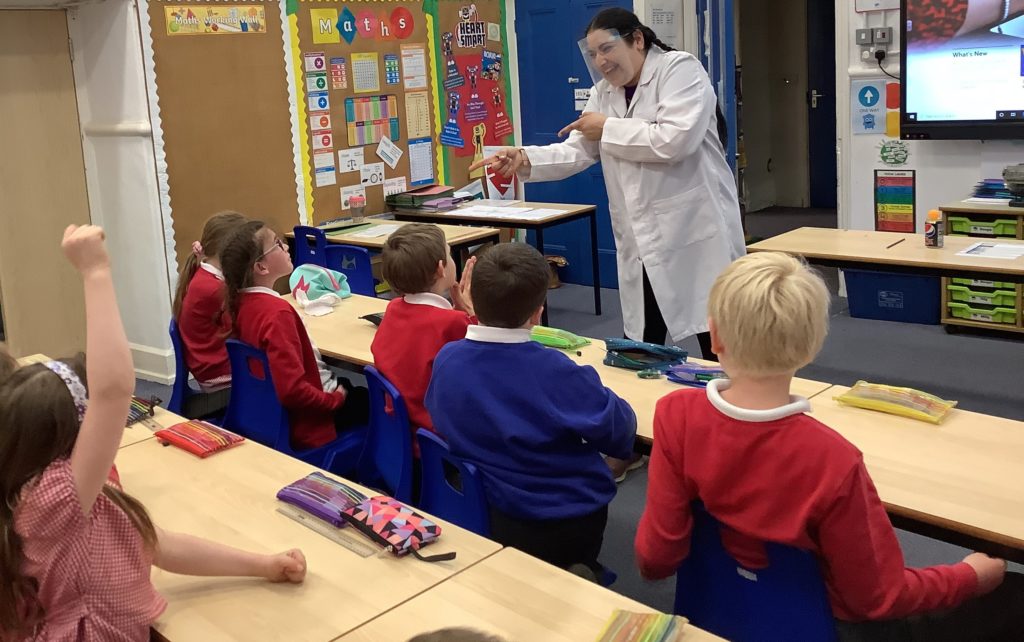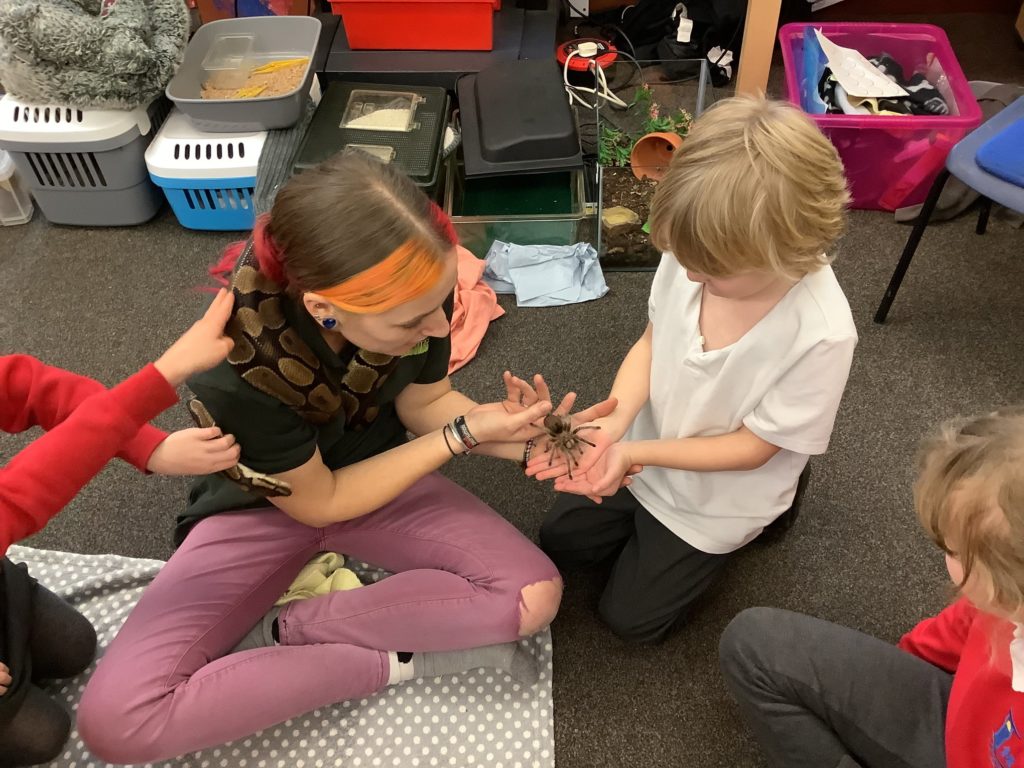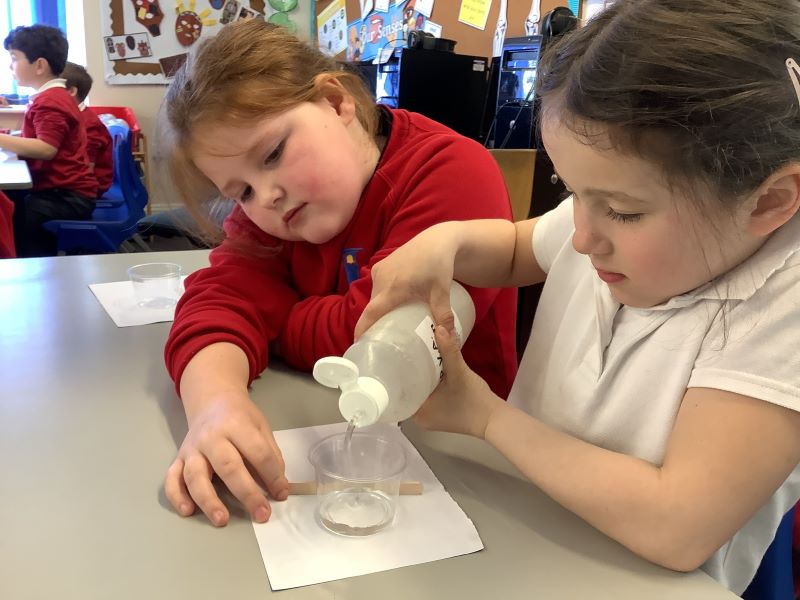- Grange-over-Sands,
- Cumbria LA11 6LE



Subject Leader: Mrs Watson
At Lindale we use the Kapow scheme of work for Science.
The impact of Kapow Primary’s Science scheme can be constantly monitored through both formative and summative assessment opportunities. Each lesson includes guidance to support teachers in assessing pupils against the learning objectives and any relevant scientific enquiry skills. Furthermore, each unit has a unit quiz and a knowledge and skills catcher, which can be used at the beginning or end of the unit to provide a summative assessment. Opportunities for pupils to communicate using scientific vocabulary will also form part of the assessment process in each unit. After implementing Kapow Primary Science, pupils should leave school equipped with the requisite skills and knowledge to succeed in science at Key stage 3. They will have the necessary tools to confidently and meaningfully question and explore the world around them and critically and analytically experience and observe phenomena. Pupils will understand the significance and impact of science on society. The expected impact of following the Kapow Primary Science scheme of work is that pupils will:
● Develop early scientific thinking skills through hands-on exploration and sensory experiences in EYFS (Reception).
● Develop a body of foundational knowledge for the biology topics in the National curriculum: Plants; Animals, including humans; Living things and their habitats; and Evolution and inheritance.
● Develop a body of foundational knowledge for the chemistry topics in the National curriculum: Everyday materials; Uses of everyday materials; Properties and changes of materials; States of matter; and Rocks.
● Develop a body of foundational knowledge for the physics topics in the National curriculum: Seasonal changes; Forces and magnets; Sound; Light; Electricity; and Earth and space.
● Evaluate and identify the methods that ‘real world’ scientists use to develop and answer scientific questions.
● Identify and use equipment effectively to accurately gather, measure and record data.
● Be able to display and convey data in a variety of ways, including graphs.
● Analyse data to identify, classify, group and find patterns.
● Use evidence to formulate explanations and conclusions.
● Demonstrate scientific literacy through presenting concepts and communicating ideas using scientific vocabulary.
● Understand the importance of resilience and a growth mindset, particularly in reference to scientific enquiry
. ● Meet the end of key stage expectations outlined in the National curriculum for science
Science Curriculum Overview – Cycle A
| Autumn 1 | Autumn 2 | Spring 1 | Spring 2 | Summer 1 | Summer 2 | |||
| EYFS | ELGS: Listening, attention, understanding; fine motor; building relationships; the natural world; speaking | |||||||
| Year 1 and 2 | Seasons | Materials | Animals | |||||
| Year 3 & 4 | Electricity | Rocks | Animals (Nutrition) | Living Things (Classification) | Forces | |||
| Year 5 & 6 | Electricity | Earth and Space | Properties of Materials | Living Things (Life Cycles) | Living Things (Classification) | |||
Science Curriculum Overview – Cycle B
| Autumn 1 | Autumn 2 | Spring 1 | Spring 2 | Summer 1 | Summer 2 | ||
| EYFS | ELGS: Listening, attention, understanding; fine motor; building relationships; the natural world; speaking | ||||||
| Year 1 and 2 | Animals | Funny Bones | Plants | ||||
| Year 3 & 4 | Light | Sound | States of Matter | Plants) | Animals (Digestion, teeth, food chains) | ||
| Year 5 & 6 | Forces | Light | Animals (Circulation and the Heart) ) | Animals (development, growth, gestation | Evolution/Inheritance | ||
Science Curriculum Overview – Cycle C
| Autumn 1 | Autumn 2 | Spring 1 | Soring 2 | Summer 1 | Summer 2 | |||
| EYFS | ELGS: Past & Present; People, culture and communities; Being imaginative and expressive; Past & Present speaking and listening | |||||||
| Year 1 and 2 | Seasons | Materials | Animals | |||||
| Year 3 & 4 | Electricity | Living Things (classification) | Rocks | Animals (Digestion, teeth, food chain) | Forces/magnets | |||
| Year 5 & 6 | Animals (circulation and the heart | Evolution/Inheritance | Animals (Development, growth, gestation) | Properties of Materials | Electricity | |||
Science Curriculum Overview – Cycle D
| Autumn 1 | Autumn 2 | Spring 1 | Spring 2 | Summer 1 | Summer 2 | |
| EYFS | ELGS: Listening, attention, understanding; fine motor; building relationships; the natural world; speaking | |||||
| Year 1 and 2 | Animals | Funny Bones – Humans | Plants | |||
| Year 3 & 4 | States of Matter | Plants | Animals (Nutrition) | Sound | Light | |
| Year 5 & 6 | Light | Living things (life, cycles, reproduction) | Living things (classification) | Earth and Space | Forces | |
Useful links
A website full of games, videos and experiment ideas that you can try out at home.
Hosts a wealth of games and activities split into age and topic sections so it’s easy to find one that relates to your child’s learning at school.
https://www.nasa.gov/kidsclub/index.html
NASA Kids’ Club provides a plethora of space focused games, videos, images and activities to introduce and help kids learn about the world of space.
https://www.brainpop.com/science/seeall/
BrainPOP offers educational animated videos and lessons covering different science topics. Each featured science topic comes with illustrative videos, quizzes, and accompanying activities.
Nat Geo Kids enables science lovers to explore the world of science through a collection of apps, games, magazines, toys, videos, and many other materials
Things to do
Encourage your children to be questioners (not always easy we know) these inquisitive instincts are vital to all areas of science.
Make observations both the natural world and the home environment is full of countless things to observe, from the changing of the seasons, the sound that fizzy pop bottle makes when you open to why does the TV remote not seem to work if I stand in the way? All these and countless more are opportunities to observe and do some real-world science and it can really help children appreciate science is all round us not just in the classroom.

